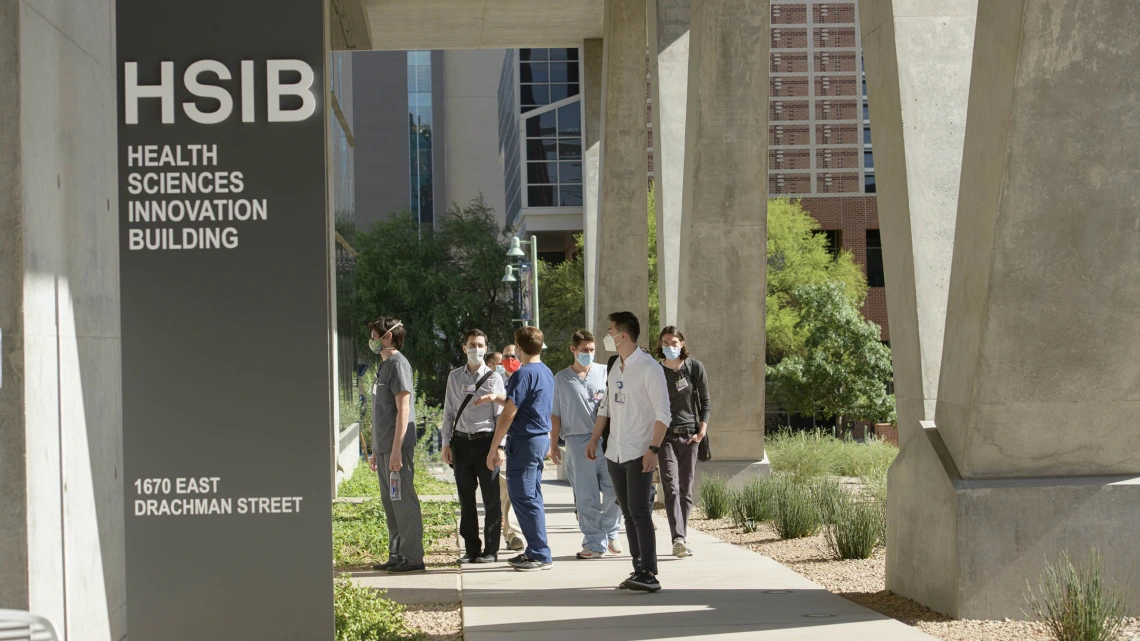Welcome Back to the New “New Normal” On Campus
Understanding your emotions and a willingness to adjust after months of social distancing are key to a successful return.

As faculty and staff return to campus, they will see masked and unmasked students and faculty. Finding the right level of comfort with being back in crowds may take some time.
It feels a little bit like a science fiction movie: After 18 months in space, traveling to a distant planet, intrepid explorers land their rocket ship and take those first awkward steps, unsure of what to expect. Is an acceptable greeting a handshake, a fist bump or an elbow tap? Who knows in this new world.
While it isn’t quite like visting a different planet, many University of Arizona Health Sciences faculty and staff may feel as though they are stepping into a new world as they return to in-person work after 18 or more months working remotely. Or, for those who have been on campus throughout most of the pandemic, a strangely familiar world awaits, full of people and awkward social interactions in halls and elevators.

Practicing hand washing and maintaining some physical distancing can be helpful to stopping the spread and easing any anxiety about returning to campus.
“You see your office for the first time, potentially, a year, year and a half later, and maybe have that flood of memories of everything that we've experienced in that time,” she said. “So it might be a little bit strange and uncomfortable, and you may feel some kind of anxiety, worry or uncertainty, and that would be completely understandable and normal for the situation.”
“I think that people are likely to experience a wide range of emotions,” said Patricia Haynes, PhD, CBSM, associate professor in the Mel and Enid Zuckerman College of Public Health. “There's obviously the possibility of some anxiety. There could be some sense of anger or mistrust about whatever policies are or are not in place. I think that there could also be a sense of relief for some people – relief to finally be in a more social environment or to have a more steady routine.”
“Some people are going to experience feelings of anxiety and trepidation,” said Jordan F. Karp, MD, professor of psychiatry, College of Medicine – Tucson. “Folks have become very comfortable spending so much time at home and might be worried about being around crowds. Many of us now include the risk of infection in our calculations about whether to visit a venue or spend time with a friend.”
‘Avoid avoiding’ how you feel
Being aware of your emotions surrounding the return to in-person work is part of the battle, but what can you do to ease any apprehension you might be feeling? “Avoid avoiding,” Dr. Haynes said. “When you're feeling anything related to fear or anxiety, the first thing is to ask yourself, ‘Why am I feeling afraid? Is there a realistic fear here? If so, then what can I do to safeguard myself?’”

Practicing hand washing and maintaining some physical distancing can be helpful to stopping the spread and easing any anxiety about returning to campus.
“And then as you transition back, check in with yourself and how you are doing, and make sure you set aside time for that, because we don't want to suppress any worries or anxieties, as they will tend to get worse.”
That self-inventory of how we are feeling is key to adjusting to being back on campus in crowds. “If you feel more comfortable wearing a mask, then by all means continue to do so even if it's not required,” said Dr. Karp.
“For some people, it's going to feel weird to return to campus,” said Dr. Haynes. “And for others, it's not going to feel weird at all. They're going to be ready to be back."

